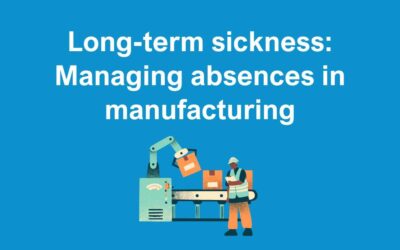Menopause in the workplace is something we are all becoming more aware of and it’s about time! Occupational Medicine of the Royal College of Physicians found that the majority of women don’t feel comfortable to talk about menopause with their employers and managers. This is a massive problem. As we approach World Menopause Day on 18th October, it’s time to educate ourselves about menopause, how it can affect our employees, and what we can do to help.
How menopause can affect your employees
According to FOM, around 30 to 60% of women experience mental or physical symptoms during menopause. This is due to the body producing less oestrogen. Physical symptoms can include hot flushes, erratic periods, headaches, and lack of sleep. Common psychological symptoms include anxiety, depression, low self-esteem, and lack of concentration.
On average, these symptoms can persist for 4 years from the last period. However, 1 in 10 women can experience these symptoms for up to 12 years. Symptoms can be so severe that some women feel they have to leave their job. This can have devastating economic and emotional consequences for women and their families. In addition, it’s important that employers support their staff as much as possible through this difficult time.
How Can We Support Employees?
The first place to start is by lifting the taboo and creating more awareness in the workplace. This can be as simple as leaving educational leaflets in staff rooms, to even offering training to line managers.
A lot of women feel uncomfortable to talk about menopause at work as they are worried it may affect their job. In addition, it’s important to offer managers education and training to learn how to manage menopause correctly in the workplace so women no longer have to feel this way.
You can also make adjustments to the office to make women feel more comfortable. This can include:
- Temperature and ventilation adjustments
- Access to desktop fans
- Drinking water
- Washroom access
- Relaxation of uniforms
- Access to a private room to manage severe symptoms
- Flexible working
- Access to Occupational Health
It’s important you put policies in place to ensure the correct conversations are taking place and the correct support is being offered.
Davina McCall: Sex, Myths, and Menopause Documentary
Davina McCall recently worked on a documentary, ‘Davina McCall: Sex, Myths, and Menopause’ with Channel 4 to tell her story and create awareness at the same time. When discussing the documentary with My Menopause Doctor, Davina said:
‘’ Women are the verge of losing their jobs or leaving their jobs because they can’t cope with it. I would love to encourage any big business to have a menopause nurse on site who can answer all of their questions, refer them to GPs and just to give advice because that’s what women seem absolutely desperate for and that’s what this documentary is about – to give advice and statistics and clear up the quagmire of differing attitudes and opinions that there are flying all over the place.’’
If you’re looking to learn more about menopause and what you can do to help, we highly recommend watching the documentary. You can watch here: https://www.channel4.com/programmes/davina-mccall-sex-myths-and-the-menopause
Menopause Policy
The benefits of having a menopause policy in place includes helping staff to stay in work and rase awareness. It’s also a guide for managers to follow when employees approach them about struggling with menopause. The policy must include information such as symptoms, employee responsibilities, suggested adjustments, confidential discussion template, sources of support, risk assessment, and more.
If you would like us to help you create a Menopause policy for your workplace, contact us now on 01383 668178 or info@thehrbooth.co.uk.







